Key takeaways:
- Maintaining hormonal balance is vital for energy, mood, and overall well-being, influenced by stress, diet, and personal habits.
- Key signs of hormonal imbalance include mood swings, fatigue, changes in appetite, and sleep issues, which require attention and management.
- Effective strategies for supporting hormonal health include dietary changes, regular exercise, stress management techniques, and potential supplements like omega-3s and magnesium.
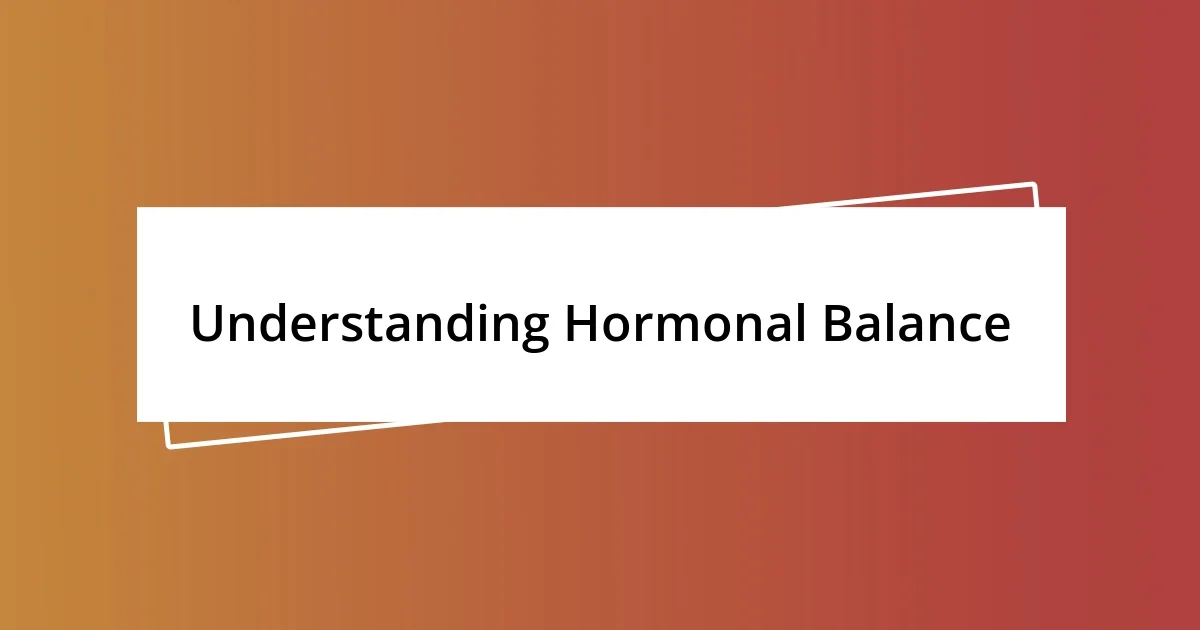
Understanding Hormonal Balance
Hormonal balance may seem like an abstract concept, but it profoundly affects our daily lives. I still remember how my energy levels plummeted when my hormones were out of sync; it left me questioning everything from my diet to my stress levels. Could something as delicate as a hormone imbalance really impact my mood? Absolutely.
When hormones are functioning properly, they orchestrate a symphony of bodily functions, from metabolism to mood regulation. I often notice that when I’m under stress, my cortisol levels spike, throwing every other hormone out of whack. It’s a reminder that our emotional states are intimately tied to our hormonal health—how often do we stop to consider that?
Understanding hormonal balance also means recognizing that each person’s needs differ. I’ve experimented with various approaches, from dietary changes to mindfulness practices, and found what works for me. Have you ever felt frustrated trying to find a solution that seems to fit everyone but you? That’s part of the journey towards finding that delicate balance tailored to your unique body.
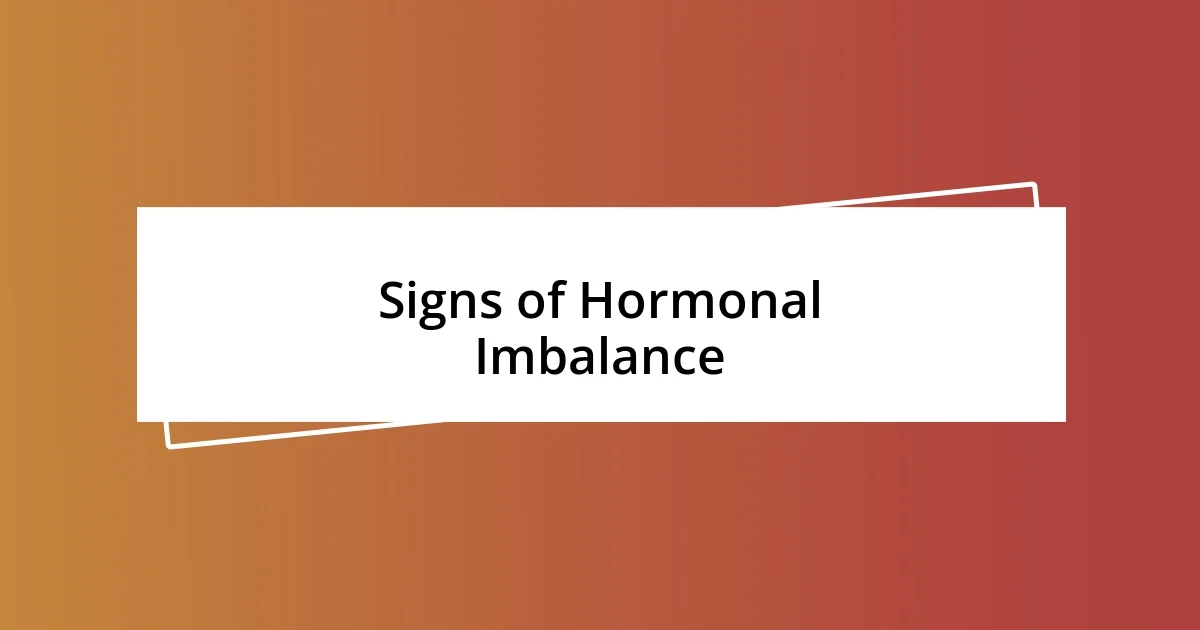
Signs of Hormonal Imbalance
When seeking to understand if your hormones are out of balance, it’s essential to watch for specific signs that can manifest in various ways. Personally, I’ve sensed shifts in my body that were hard to ignore—like the sudden mood swings or those unshakeable feelings of fatigue. These signals are often subtle at first but can grow increasingly pronounced if not addressed.
Here are some key signs to take note of:
- Unexplained weight gain or loss
- Irregular menstrual cycles or heavy periods
- Persistent fatigue or low energy
- Mood swings, anxiety, or depression
- Difficulty sleeping or insomnia
- Changes in appetite or cravings
- Skin issues like acne or unusual dryness
- Decreased libido or sexual dysfunction
It was eye-opening for me to connect the dots between my emotional state and physical symptoms. For instance, during a particularly stressful period, I noticed my skin flaring up, which was an immediate red flag prompting me to pay better attention to my overall hormonal health. Recognizing these manifestations has made all the difference in my journey towards achieving balance.
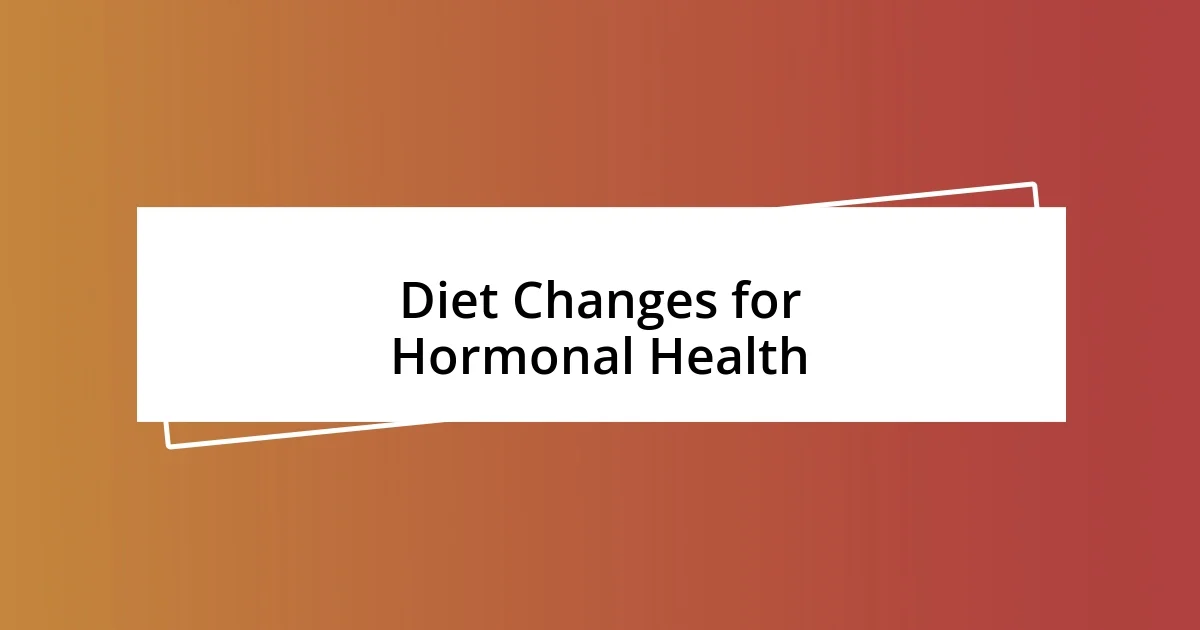
Diet Changes for Hormonal Health
When it comes to maintaining hormonal health, diet changes can serve as a powerful ally. I’ve found that incorporating more whole foods not only helps me feel more energetic but also stabilizes my mood. For instance, adding leafy greens like spinach and kale into my daily meals has made a noticeable difference in how I feel throughout the day. It’s like nourishing my body at a cellular level.
On the flip side, I learned that certain processed foods can wreak havoc on hormonal balance. Not too long ago, I made a conscious effort to reduce my intake of refined sugars and unhealthy fats. Interestingly, I noticed an improvement in my skin’s clarity and an increase in energy levels. It’s fascinating how food acts as fuel, influencing both physical health and emotional well-being.
Exploring food that supports hormonal balance has led me to dive deeper into the relationship between specific nutrients and hormone levels. For example, omega-3 fatty acids, found in fatty fish and flaxseeds, have become a staple in my diet. When I started incorporating these, I felt more balanced overall, and my inflammation levels seemed to decrease as well. It’s all about connecting those dots and realizing how our diet shapes our hormonal health.
| Food Type | Impact on Hormones |
|---|---|
| Whole Grains | Help regulate insulin levels |
| Leafy Greens | Rich in nutrients that support hormone production |
| Refined Sugars | Hinder hormonal balance, leading to spikes in energy and mood |
| Omega-3 Fatty Acids | Reduce inflammation and balance hormones |
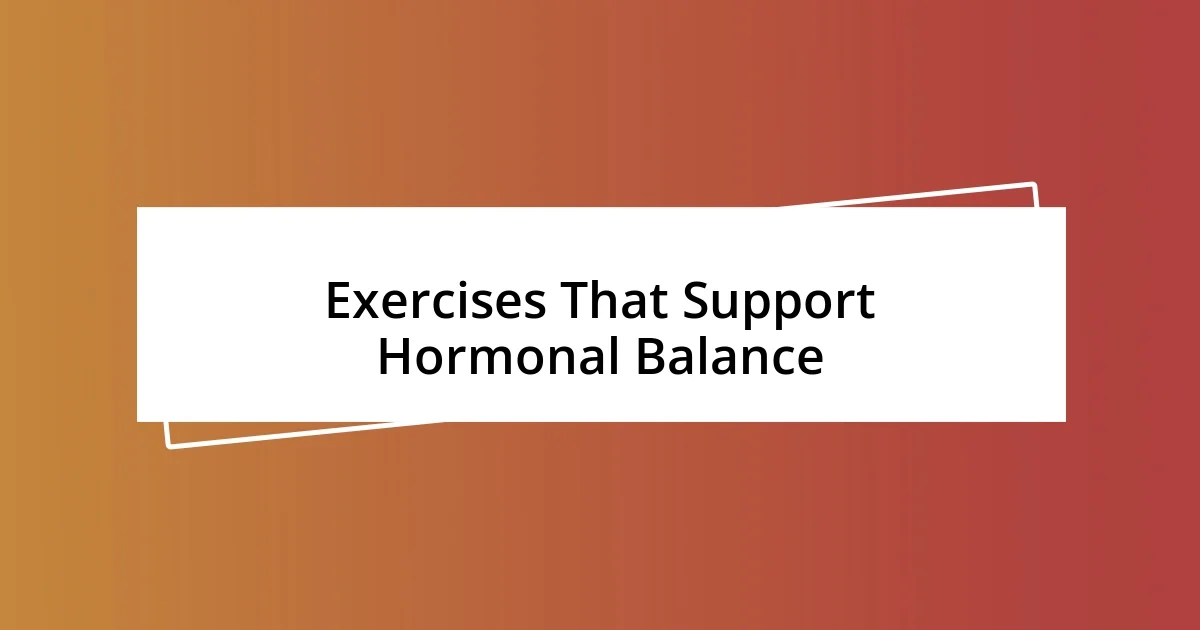
Exercises That Support Hormonal Balance
When it comes to exercises that support hormonal balance, I’ve discovered that incorporating both strength training and cardiovascular activities can make a significant difference. I remember one month when I decided to commit to more consistent weightlifting. It was empowering to see how not only my muscles became stronger but also my mood lifted substantially. Have you ever noticed how even just a short session of lifting weights can leave you feeling accomplished and energized?
Yoga has also become a cornerstone in my routine. The calming practice helps me manage stress levels, which I’ve found is crucial for maintaining a healthy hormonal balance. I still recall my first yoga class; I walked out feeling lighter and more centered. It’s incredible how deep breathing and gentle stretching can realign not just the body, but also the mind.
Moreover, interval training is another workout I swear by. Just a couple of rounds of high-intensity intervals leave me invigorated and ready to tackle the day. I’ve often wondered why such short bursts of effort yield benefits that last longer than the workout itself. Every time I include this type of training, I notice a marked improvement in my overall energy and productivity levels throughout the day. It’s a testament to how dynamic workouts can truly support hormonal equilibrium.
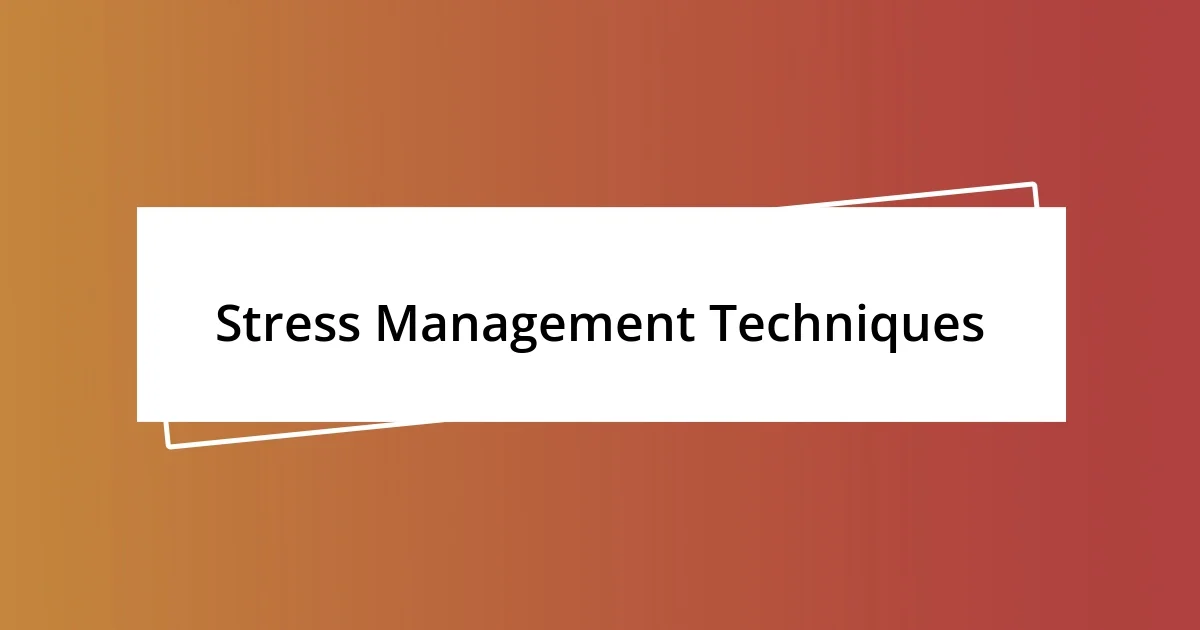
Stress Management Techniques
Maintaining a sense of balance in life can feel like a juggling act, especially when it comes to stress management. One technique I swear by is mindfulness meditation. It was a game-changer for me. I remember my first session—I thought my mind would race endlessly, but instead, I discovered a surprising sense of calm. Breathing deeply and focusing on the present helps me release pent-up tension and supports a more stable hormonal environment.
Another aspect of stress management that I find incredibly beneficial is time spent in nature. On weekends, I make it a point to go for long walks in the park or on hiking trails. There’s something refreshing about being surrounded by greenery; it helps me disconnect from daily stressors. I always come back feeling lighter, like I’ve shed a layer of worries. Have you ever just stopped to listen to the rustling leaves? It’s remarkable how such simple moments can bring clarity and peace.
Moreover, I’ve explored journaling as a way to process my emotions. When I jot down my thoughts at the end of the day, it’s almost therapeutic. I reflect on what went well, and what didn’t, and I find that this practice illuminates patterns that contribute to my stress. Have you ever tried writing out your feelings? It’s like having a conversation with yourself, allowing you to better understand and navigate your emotional landscape, which is vital for maintaining that hormonal balance we all strive for.
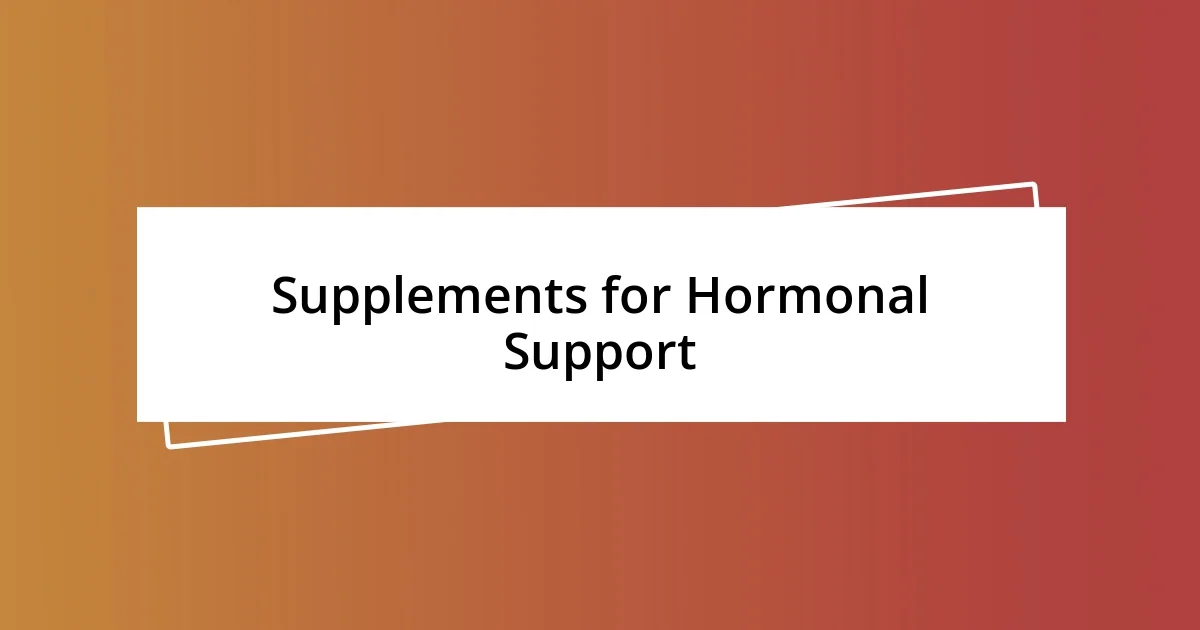
Supplements for Hormonal Support
When it comes to supplements for hormonal support, I’ve found that adaptogenic herbs play a pivotal role. For instance, I started incorporating ashwagandha into my daily routine after learning about its stress-lowering properties. I can’t believe how much calmer I feel throughout the day; it’s like a gentle hand easing the tension in my mind. Have you ever noticed how our bodies respond differently to stress? It’s fascinating how something as simple as a supplement can create a ripple effect in our overall wellbeing.
Another supplement I’ve found beneficial is omega-3 fatty acids. Initially, I was skeptical, but after a few weeks of adding a high-quality fish oil to my diet, I felt a noticeable shift in my energy levels. I often wonder if others experience the same boost—does it make you feel more vibrant too? The anti-inflammatory effects seem to support not just physical health but also mental clarity.
Lastly, I can’t overlook the importance of magnesium. I began taking a magnesium citrate supplement when I realized how much it helps with sleep and muscle relaxation. On nights when I remember to take it, I sleep like a baby. Conversely, if I forget, I wake up feeling a bit off, as if my body is gently reminding me that balance is key. Have you considered how often little tweaks in our routines can compel us toward a healthier hormonal state? It’s those small adjustments that often yield the greatest benefits.
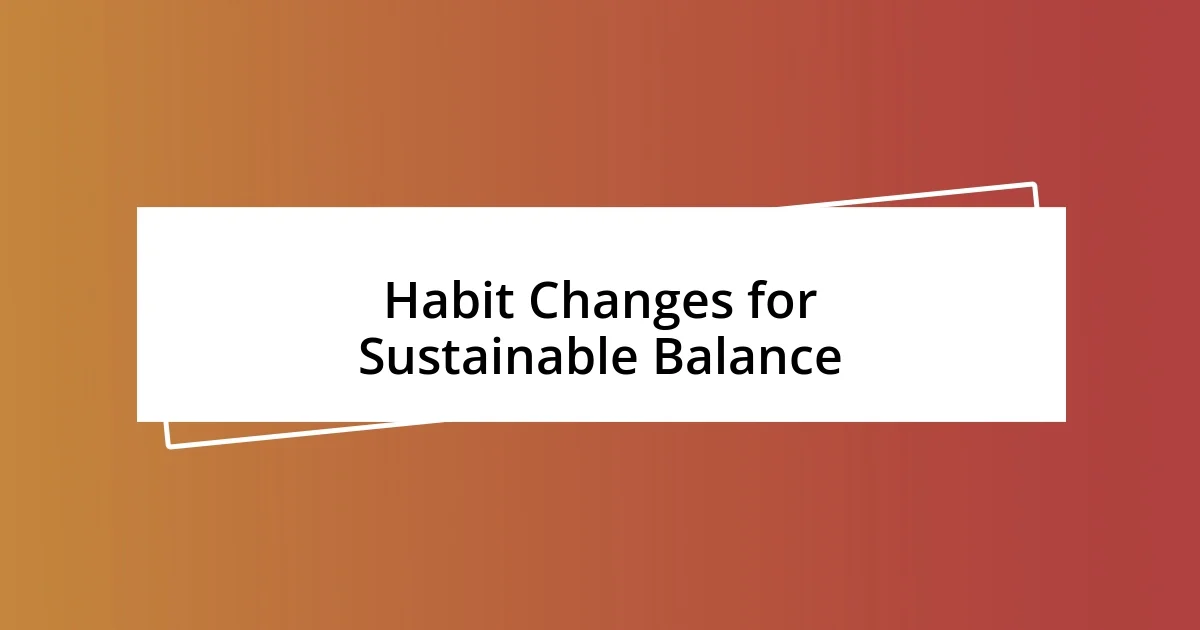
Habit Changes for Sustainable Balance
Changing daily habits can make a huge difference in maintaining hormonal balance. For example, I used to skip breakfast, but then I learned how crucial morning nutrition is. Now, I always start my day with a protein-rich smoothie, and it feels like I’m giving my body the fuel it needs to tackle the day ahead. Have you ever noticed how the right breakfast can change your mood and energy levels? It’s like a reset button.
In my quest for balance, I’ve also committed to regular exercise. Initially, I thought it was just about staying fit, but I’ve come to appreciate its profound impact on my hormones. Whether it’s a brisk walk or a yoga session, those intentional movements release endorphins that elevate my mood. There are days I dread starting my workout, but I remind myself of the rewards. Have you ever felt that post-exercise high? It’s invigorating!
Finally, I’ve made it a point to prioritize sleep hygiene. I used to binge-watch shows late into the night, but I quickly realized the toll it took on my hormonal health. Now, I’ve established a calming nighttime routine that includes shutting off screens an hour before bed and engaging in quiet activities like reading. While some may think sacrificing Netflix is tough, the quality sleep I gain is absolutely worth it. Have you tried creating a similar routine? The difference it can make to your overall wellbeing is astonishing!













